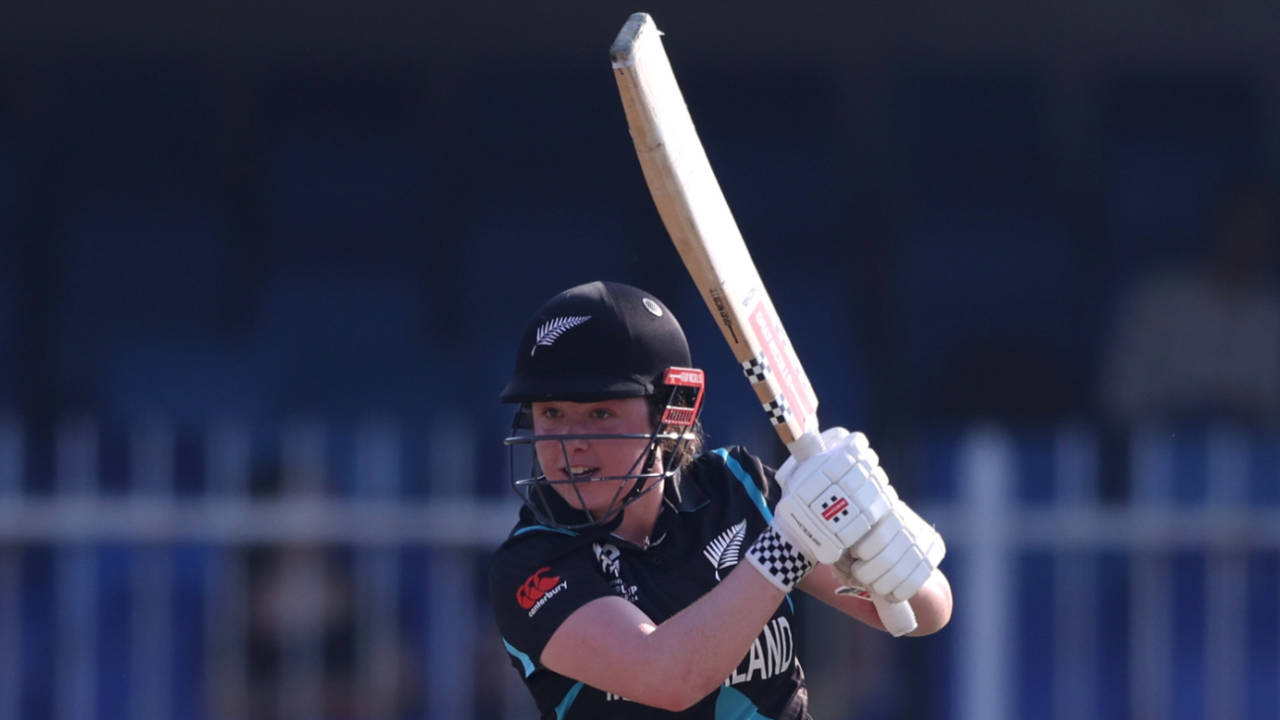“You’ve got to remember she’s only 20, and if she continues to do what she did today she has a bright future” – Georgia Plimmer lauded by captain Sophie Devine
Georgia Plimmer set the pace in New Zealand’s chase • ICC/Getty Images
Georgia Plimmer skipped down the pitch and hammered Sugandika Kumari over mid-off where Chamari Athapaththu leapt and thrust her hand above her head in vain, the ball racing to the boundary.
The next time Plimmer advanced to such great effect she placed the ball just short of mid-off where Athapaththu was nutmegged in a clumsy attempt to get to the bounce and Sri Lanka were punished by another four.
They were among just four boundaries for Plimmer who used her feet well, whether travelling to meet the pitch of the ball and dispatch it down the ground or using her crease to create space and access the off side en route to 53, her equal career-best score, at a strike rate of 120.45. It was her second half-century in T20Is and the first of this World Cup in Sharjah, which has proved a difficult ground for batters with its low bounce and vast, slow outfield.
And this was just the innings New Zealand had been seeking form her.
Plimmer arrived in England for a bilateral series in June and July amid some excitement from the White Ferns. That didn’t abate when she opened with 29, second only to Brooke Halliday’s fighting fifty, in a heavy loss for New Zealand in the first ODI. But it was to be the pinnacle of an otherwise disappointing tour for Plimmer, who only reached double figures once more – in the second T20I – as New Zealand lost both series 3-0.
She hinted at this innings last month in scoring 53 against Australia in the third T20I in Brisbane as both teams put the finishing touches on their World Cup preparations.
Here, a 49-run opening stand with Suzie Bates laid the foundation for New Zealand’s second win from three matches and a 46-run partnership with Amelia Kerr, who had taken 2 for 13 to restrict Sri Lanka to 115 for 5, all but saw the White Ferns home. Sophie Devine, the captain, ended it with the only six of the match, muscling Sugandika Kumari over cow corner.
“I wanted to back my skills,” Plimmer said upon receiving the Player of the Match award. “I had good conversations with the coaches and the senior players, and just wanted to play my brand. It’s a pretty special group we have. We are clear on how we want to play, trying to put our best foot forward. We have had a tough six months but to come out here and put together wins, it gives us huge confidence.”
Devine was delighted by Plimmer’s gumption, which was particularly impressive at a venue where batters have had to learn the hard way how to get in, stay in and accumulate runs.
“Georgia Plimmer was outstanding,” Devine told the post-match presentation. “Super proud of the youngster coming out and sticking to her strengths. She’s copped a fair bit of criticism which as a captain is hard to see because you see the work she has been putting in. She had a great knock against Australia in Australia and to see her grow, you’ve got to remember she’s only 20, and if she continues to do what she did today she has a bright future.”
This was also more like the Chamari Athapaththu the tournament had been waiting for but even a sense of too little, too late fizzled out when she fell for a 41-ball 35.
Athapaththu’s failure to reach double figures at the tournament until now had only highlighted Sri Lanka’s reliance on her – she scored just 10 runs across their first three matches, by which point their campaign was over.
On Saturday she scored five fours including two in Leigh Kasperek’s first over of the tournament, threaded through cover point and punched through the covers again. But when she dragged on off Kerr in the 14th over, Sri Lanka lost all momentum.
With their tournament over even before this match, Sri Lanka coach Rumesh Ratnayake said his team was on a mission to ensure they performed better next time.
“Everybody expected us to be, not the top dog, but the top underdog, so to speak,” he said. “We were in this group where we had some very strong teams and we wanted to win those games but I think the expectation, as much as the world had that expectation, it got to the team.
“In the last 48 hours to 60-72 hours, we were trying to work it out, what really went wrong. That’s a work in progress and that’s the thing which we have to work out for the future, so that this will not happen again.”
Valkerie Baynes is a general editor, women’s cricket, at ESPNcricinfo



